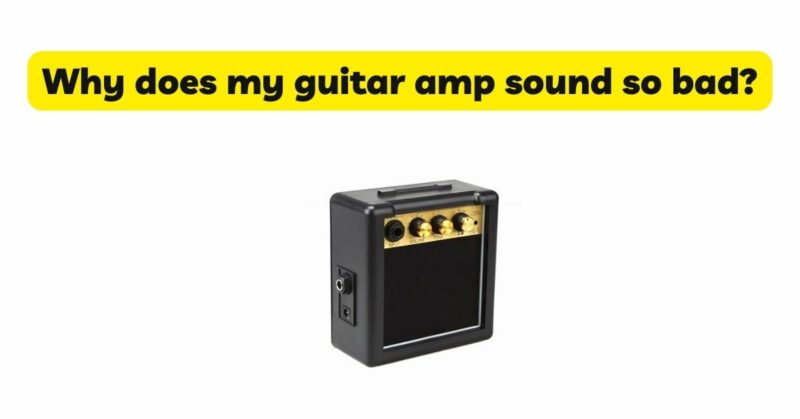As a guitarist, encountering a disappointing sound from your amplifier can be frustrating and hinder your musical expression. A multitude of factors can contribute to a guitar amp sounding bad, ranging from technical issues to improper settings and poor equipment choices. In this article, we will delve into the common reasons why a guitar amp may sound unsatisfactory. By understanding these factors, you can diagnose the problem, troubleshoot accordingly, and elevate your amp’s sound quality to new heights.
- Technical Issues: a. Faulty Tubes: Vacuum tubes play a vital role in shaping the sound of a tube amp. When tubes wear out or become damaged, they can introduce noise, distortion, or diminished output quality, resulting in a bad sound. b. Aging or Damaged Speakers: Over time, speakers can deteriorate or suffer damage, affecting their ability to accurately reproduce sound. This can lead to muffled tones, distorted frequencies, or a lack of clarity. c. Power Supply Problems: Inadequate or unstable power supply can affect the performance of an amp, causing it to sound weak, distorted, or produce unwanted noise. Ensure your amp is receiving consistent and clean power to avoid such issues.
- Improper Amp Settings: a. Incorrect EQ and Tone Controls: Inadequate adjustment of EQ and tone controls can result in a flat, muddy, or harsh sound. Experiment with different settings to find the right balance for your desired tone. b. Inappropriate Gain Staging: Improper gain staging can cause excessive distortion or insufficient gain, leading to an unbalanced or unsatisfactory sound. Adjust the gain settings to achieve the desired level of distortion and clarity.
- Guitar and Amp Mismatch: a. Incompatible Pickups: Pickups with mismatched impedance or tonal characteristics can negatively impact the sound when paired with an amp. Ensure your guitar’s pickups are compatible with the amp to achieve the best possible tone. b. Playing Style and Genre Considerations: Different amps excel in specific genres or playing styles. If your amp is not suited to your preferred style, it may not deliver the desired tone, resulting in a bad sound.
- Room Acoustics: a. Unfavorable Room Reflections: Poor room acoustics, such as excessive reflections, can cause sound waves to bounce around and interfere with the direct sound from the amp. Consider acoustic treatments to minimize unwanted reflections and improve the overall sound quality. b. Standing Waves: Standing waves caused by room dimensions can create peaks and nulls in certain frequencies, leading to an uneven frequency response. Adjusting the placement of the amp and your listening position can help mitigate standing wave issues.
- Poor Cable Quality: Low-quality or damaged cables can introduce unwanted noise, signal loss, or interference, degrading the sound quality of your guitar amp. Invest in high-quality cables and regularly inspect them for any signs of wear or damage.
- Insufficient Maintenance: Neglecting regular maintenance can contribute to a bad-sounding amp. Dust and debris can accumulate, affecting the performance of components, especially in tube amps. Regularly clean and maintain your amp to ensure optimal sound quality.
- Personal Preferences: It’s important to consider personal preferences when evaluating the sound of your amp. Every guitarist has unique tonal preferences and expectations. Take the time to experiment with different settings and configurations to find the sound that resonates with you.
Conclusion: A bad-sounding guitar amp can dampen your musical inspiration and hinder your ability to convey your artistic vision. By identifying and addressing technical issues, adjusting amp settings, ensuring a suitable guitar and amp match, considering room acoustics, using high-quality cables, performing regular maintenance, and embracing personal preferences, you can elevate the sound quality of your amp. Remember that achieving the desired sound often involves experimentation and fine-tuning to find the sweet spot that brings your music to life. With careful attention to these factors, you can overcome the challenges and enjoy the satisfying sound your guitar amp is capable of producing.


